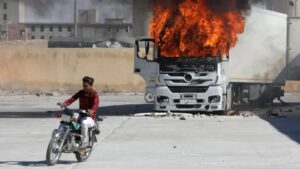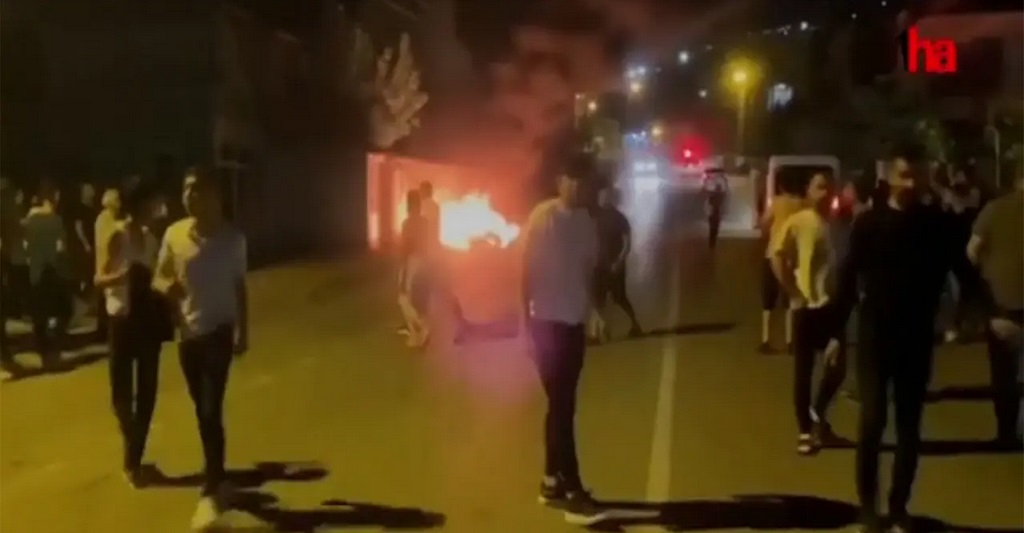Violence on both sides of the border
Since the beginning of the Syrian civil war, Turkey has taken in more than three million refugees. Now there are serious riots against Syrians in Turkish cities – and anti-Turkish protests in Syria.
Pogrom-like conditions erupted on Sunday evening in Kayseri, a conservative city of millions in the middle of Anatolia. “We don’t want any more Syrians, we don’t want any more refugees,” demonstrators chanted. They didn’t stop at just words: numerous shops, homes and cars belonging to Syrians were vandalized with stones and clubs, and in at least one case set on fire.
And although Kayseri is a stronghold of Turkish President Recep Tayyip Erdogan and his AKP party, the rioters were demanding that Erdogan resign. They held him responsible for the many refugees in the country. The refugees were accused of being the cause of the tense economic situation with high prices and a shortage of housing. Almost 500 people were taken into custody.
On Monday, the protests spread to several other cities, from Gaziantep on the Syrian border to Bursa in the west. The police responded with water cannons and tear gas. Interior Minister Ali Yerlikaya said the number of rioters taken into custody the next day was almost 500, many of whom had previous convictions.
Riots against refugees have occurred frequently in Turkey. Before the parliamentary and presidential elections last year, for example, the umbrella organization of Syrian associations in Turkey complained about increasing violence during the election campaign. Spokesman Mohammed Aktar told the ARD studio in Istanbul at the time: “Yes, we see that very clearly. Unfortunately, it was the same in 2019. Before the local elections at that time, Syrians were made an election issue. They were accused of all sorts of things, including in the media. After the elections, in 2020 and 2021, we had no problems. All discussions were over in no time.”
This time, there are no elections. The reason why mobs are still roaming the streets is a message that spread on social media: A Syrian man is alleged to have sexually harassed a seven-year-old Syrian girl. The man has since been arrested.
But the violence did not end there, it changed sides: As a result of the riots in Turkey, anti-Turkish protests are now taking place in northern Syria. “Come on, men, come on, smash the cars!” In an internet video that has been viewed around five million times within a short period of time, men attack Turkish trucks at the Al Bab border crossing with paving stones, clubs and iron bars. Windows are broken. The men shout: “Come on, get lost! Come on, go back to Turkey!”
In the eyes of the Turkish opposition, the background to the tensions is not, or not only, the incident in Kayseri. Rather, there is speculation about a possible upcoming meeting between Turkish President Erdogan and Syrian ruler Bashar al-Assad. Both have been hostile towards each other since the outbreak of the Syrian war.
A possible rapprochement is unsettling both the Syrian refugees in Turkey because they fear having to return to Syria and the Turkish-loyal rebels in Syria because they fear for their protection from Erdogan.
Such a meeting could be arranged as early as this week by Russian President Vladimir Putin, Assad’s most important ally. Erdogan is expected to meet Putin on the sidelines of the Shanghai Cooperation Organization summit, which begins in Kazakhstan on Wednesday.
The situation is increasingly worrying for women and girls on both sides of the border. The alleged sexual harassment incident in Kayseri has sparked a wave of violence against Syrian refugees, many of whom are women and children. In the anti-Turkish protests in Syria, men are seen attacking Turkish trucks, putting women and girls traveling on those vehicles at risk.
In Turkey, Syrian refugee women face a double burden. Not only do they have to deal with the hostility and violence of the local population, but they also have to navigate the patriarchal structures within their own communities. Many are vulnerable to domestic violence, sexual exploitation, and limited access to education and healthcare.
 Fatima, a 32-year-old Syrian refugee living in Istanbul, shares her story: “When we fled Syria, we thought we would find safety and a better life in Turkey. But the reality is very different. My husband is often out of work, and when he is home, he is angry and takes it out on me and the children. I’m scared to leave the house sometimes because of the hostility from the locals. And I worry about my daughters, who are not allowed to go to school. I feel trapped and helpless.”
Fatima, a 32-year-old Syrian refugee living in Istanbul, shares her story: “When we fled Syria, we thought we would find safety and a better life in Turkey. But the reality is very different. My husband is often out of work, and when he is home, he is angry and takes it out on me and the children. I’m scared to leave the house sometimes because of the hostility from the locals. And I worry about my daughters, who are not allowed to go to school. I feel trapped and helpless.”
The situation is equally dire for women and girls in northern Syria. The region is controlled by a patchwork of armed groups, including Turkish-backed rebels and Kurdish forces. Sexual violence, forced marriage, and trafficking are widespread. Women’s rights activists in the area report that attacks on women have escalated since the anti-Turkish protests began.
Leila, a 25-year-old activist in Idlib, says, “The women and girls are caught in the crossfire of this conflict. They are vulnerable to violence from all sides – the Syrian regime, the rebel groups, and now the Turks. We are doing our best to protect them, but the situation is becoming increasingly dire.”
The violence on both sides of the border is having a devastating impact on women and girls. They are facing a double threat – from the hostility of the local populations and the ongoing conflicts in the region. Aid organizations and women’s rights groups are working tirelessly to provide support and protection, but the challenges are overwhelming.
As the tensions continue to escalate, the international community must step in to address the root causes of the conflict and ensure the safety and well-being of all those caught in the crossfire. The women and girls of Syria and Turkey deserve to live in peace and dignity, free from the threat of violence and oppression.

